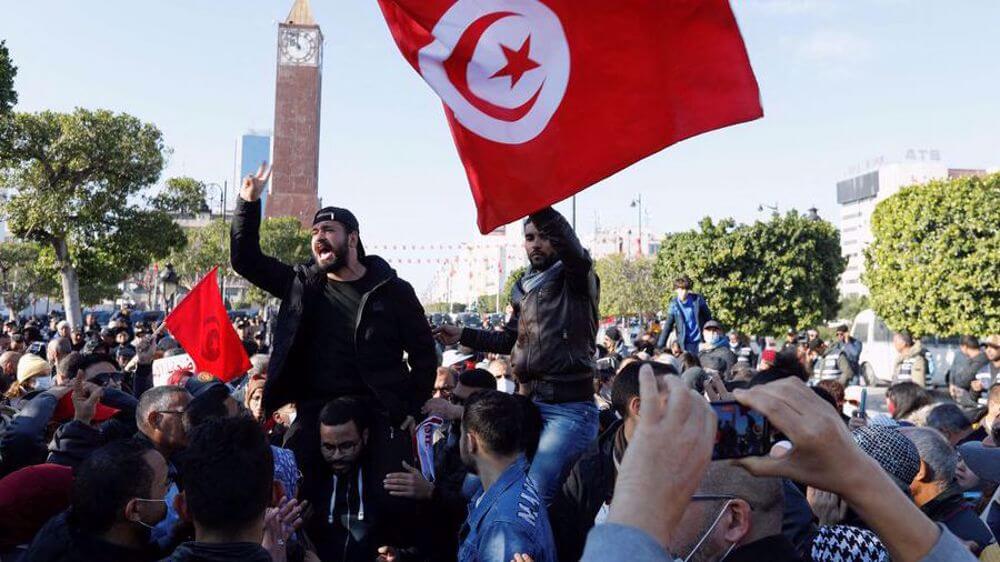Nationwide protests erupted in Tunisia on Sunday after President Kais Saied issued a decree to replace the country’s judicial watchdog, the Supreme Judicial Council (SJC), and give himself extraordinary judicial powers. The move came a week after Saied announced that he was dissolving the SJC.
Hours after the announcement, thousands of protesters took to the streets of Tunis and other cities to protest against Saied’s move and show support for an independent judiciary. Demonstrators chanted slogans like “shut down the coup [...] take your hands off the judiciary” and “Freedom! Freedom! The police state is finished.” The protests were organised by the Islamist Ennahda party and civil society groups.
Also Read: A Decade After the Success of the Arab Spring, Is Tunisia Following Egypt’s Path?
According to the ruling, the SJC will be replaced by a 21-member provisional Supreme Judicial Council. The decree also allows Saied to directly appoint nine judges to the new Council and gives him the power to dismiss any judge who is deemed to be “failing [in] his professional duties.”
Furthermore, the decree prohibits judges of all ranks to strike or organise collective action against the state, saying that it “could disturb or delay the normal working of the courts.” According to Tunis Afrique Press, Saied had invited Prime Minister Najla Bouden Romdhane and Justice Minister Leila Jaffel for consultations after the announcement was made.
Saied accused the judiciary of corruption and said that the judicial system needed to be transformed. “Whoever remains silent in the face of injustice becomes an accomplice, which is why the SJC has been dissolved and will be replaced by another provisional council, to put an end to impunity,” he said.
Demonstrators took to the streets in the Tunisian capital on Sunday, after President Kais Saied cemented his grip over the judiciary by issuing a decree that grants him control over the selection and promotion of judges. pic.twitter.com/ZTFP8q5xFF
— Middle East Eye (@MiddleEastEye) February 13, 2022
He added that the new Council will make the judicial system fair, as a “fair trial before a fair court is a sacred duty and one of the legitimate claims of Tunisians.” The decree also states that the new Council will “enjoy functional, administrative and financial independence.”
Last week, Saied announced that he had dissolved the SJC, a top independent judicial watchdog, after accusing its members of bias and corruption. He said that the SJC was a “thing of the past” and noted that Council judges had taken “billions” in bribes.
However, the SJC’s President, Youssef Bouzakher, rejected the President’s decision to dissolve the Council and said that it would continue to function, as the President has no power to dissolve the SJC under the constitution. “We continue to carry out our duties and we will defend the judicial council with all means at our disposal,” Bouzakher declared.
Opposition leaders have called Saied’s move to dissolve and replace the SJC a part of his “power grab” and an attempt to bring the executive, legislature, and judiciary under presidential control.
The move was also condemned by the International Commission of Jurists, which stated on Sunday that the decree “consolidates power in the hands of the President/executive and effectively ends any semblance of judicial independence.” The Commission added: “It brings Tunisia back to its darkest days, when judges were transferred and dismissed on the basis of executive whim,” referring to the regime of Zine El Abedine Ben Ali, who was ousted in 2011.
In July 2021, Saied dismissed the PM, indefinitely suspended the parliament, and lifted the immunity of all lawmakers. The decision was condemned by the opposition, who called it a coup. The Ennahda Party said it was “unconstitutional, illegal, and invalid” and that it marked a “return to dictatorship.”

